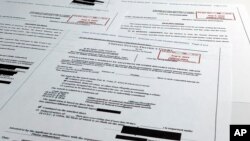Lawyers for former U.S. President Donald Trump have asked a federal court to temporarily block the FBI from reviewing documents recovered from his Florida estate until a special master can be appointed to separate out any materials covered by executive privilege and return them to him.
Federal investigators are probing whether Trump illegally kept records, including numerous highly classified national security documents, as he left office in January 2021, rather than turning them over to the National Archives as he was required to do under U.S. law.
The FBI seized 11 sets of classified materials from Trump’s Atlantic oceanside estate in Florida earlier this month, including some labeled with the nation’s highest level of classification that are supposed to be viewed only in secure government facilities. The National Archives and Justice Department officials also removed sets of boxes from the estate in January, and again in June, that should have been turned over to the agency when Trump left office.
The New York Times reported Monday that the government has recovered more than 300 classified documents from Trump’s estate, including CIA, National Security Agency and FBI materials, although the content of the material has not been disclosed.
Trump has criticized the proceedings, and his legal filing called the August 8 FBI search a “shockingly aggressive move.”
Attorney General Merrick Garland has said he authorized the search, and a federal magistrate approved it after the FBI asserted in an affidavit that it believed a crime had been committed.
Trump’s allies have asserted that he had a “standing order” to declassify material taken out of the Oval Office at the White House, but no paperwork has been produced confirming he did so.
Following the August 8 search, some of the biggest U.S. news organizations asked federal magistrate Bruce Reinhart in Florida to make public the FBI affidavit detailing the probable cause for conducting the search. The Justice Department opposes release of the document for fear it would jeopardize its investigation and divulge the names of cooperating witnesses.
The magistrate judge says he is considering releasing a redacted version of the affidavit but acknowledged Monday that if key portions of it are blacked out, as requested by government prosecutors, its release would be virtually meaningless.
He has ordered prosecutors to present their proposed redactions by Thursday.





